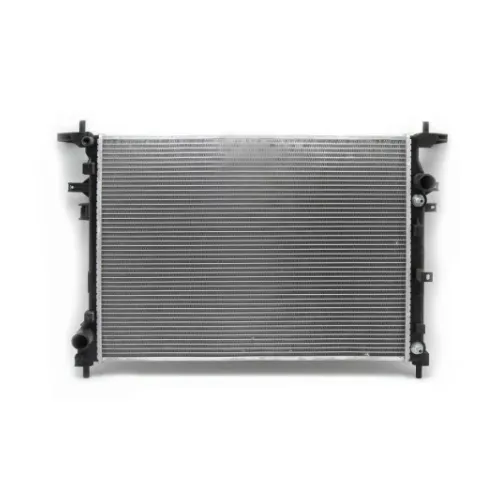The Role of Corrosion in Deteriorating the Efficiency of Automotive Aluminum Plastic Radiators
2024-11-28
Automotive radiators are critical components in maintaining engine temperature, and the advent of aluminum plastic radiators has been a significant leap in automotive design. Their combination of lightweight aluminum and durable plastic provides numerous advantages, including better heat dissipation, reduced weight, and improved fuel efficiency. However, like all materials exposed to harsh environments, aluminum plastic radiators are vulnerable to corrosion. The impact of corrosion on the performance of these radiators can be substantial, leading to overheating, leaks, and even total radiator failure. In this blog, we’ll dive into how corrosion affects aluminum plastic radiators, the factors that contribute to corrosion, and the measures that can be taken to prevent or mitigate its effects.
Why Are Aluminum Plastic Radiators Susceptible to Corrosion?
Corrosion is a natural process that occurs when metals react with their environment. For aluminum plastic radiators, several environmental and operational factors contribute to the onset and progression of corrosion:
1. Aluminum’s Reactivity:
While aluminum is known for its excellent thermal conductivity and lightweight nature, it is also prone to corrosion when exposed to moisture, salts, and other environmental elements. The metal forms a thin oxide layer that can protect it, but this layer can break down over time, allowing corrosion to penetrate deeper into the material.
2. Contact with Dissimilar Metals:
Aluminum plastic radiators often feature a mix of materials, including aluminum cores and plastic tanks. However, if these aluminum cores are in contact with other metals like copper or brass, galvanic corrosion can occur. This type of corrosion happens when two different metals create an electrochemical reaction, leading to the accelerated deterioration of aluminum components.
3. Environmental Factors:
Road salt, rain, and other environmental factors can exacerbate corrosion in radiators. Vehicles exposed to these elements over long periods, particularly in colder climates, are more likely to experience corrosion-related damage. The combination of water and salt creates an ideal environment for corrosion, especially if the radiator is not properly maintained.
How Does Corrosion Affect Radiator Performance?
Corrosion does not just affect the aesthetic quality of the radiator; it can have profound impacts on its functionality. As corrosion progresses, it can cause several issues that directly affect the performance of the radiator and the overall health of the engine.
1. Decreased Heat Transfer Efficiency:
The aluminum core of the radiator is designed to absorb heat from the engine and dissipate it into the surrounding air. When corrosion sets in, the
aluminum surface becomes pitted or rough, reducing the radiator’s ability to transfer heat effectively. This inefficiency leads to higher engine temperatures, which can result in overheating and potential engine damage.
2. Coolant Leaks:
One of the most common consequences of corrosion in aluminum plastic radiators is the formation of leaks. Corrosion weakens the structure of the radiator, causing small holes or cracks to form, particularly at the junctions where the plastic components meet the aluminum core. Coolant leaks reduce the amount of coolant available to the engine, further exacerbating overheating issues and potentially leading to engine failure.
3. Structural Weakening:
As corrosion progresses, it weakens the overall structure of the radiator. The plastic tanks and end caps may become brittle and crack, especially when exposed to high heat or pressure. The aluminum core, which is essential for effective heat dissipation, may become fragile, causing the radiator to fail prematurely.
4. Increased Maintenance and Replacement Costs:
Corrosion-related damage to radiators is often not noticed until the damage is severe. At that point, the radiator may require costly repairs or even a full replacement. Prolonged corrosion can also affect other components of the vehicle’s cooling system, increasing the overall maintenance costs.
What Contributes to Corrosion in Aluminum Plastic Radiators?
1. Use of Low-Quality Coolants:
Coolants that are not formulated with proper corrosion inhibitors can accelerate the degradation of aluminum radiator components. The wrong pH levels in the coolant, either too acidic or too alkaline, can break down the protective oxide layer on aluminum, making it more susceptible to corrosion.
2. Improper Maintenance:
Regular maintenance is crucial in preventing corrosion. Failing to flush and replace the coolant, or neglecting to check for leaks or signs of corrosion, allows corrosive agents to accumulate and damage the radiator.
3. Environmental Exposure:
Radiators exposed to harsh environmental conditions, such as heavy rainfall, road salt, or extreme heat, are more prone to corrosion. Vehicles driven in coastal or cold climates with road salt usage are particularly vulnerable.
Preventing Corrosion in Aluminum Plastic Radiators
1. Proper Coolant Maintenance:
Regularly changing the coolant and ensuring that it is properly mixed with antifreeze can significantly reduce the risk of corrosion. Additionally, using coolant additives that contain corrosion inhibitors can help protect the aluminum components from degradation.
2. Corrosion-Resistant Coatings:
Some radiators come with protective coatings designed to shield the aluminum surface from corrosive elements. These coatings help preserve the radiator’s integrity by preventing direct contact with moisture, salts, and other environmental factors.
3. Regular Inspections:
Periodic checks of the radiator for signs of corrosion, such as rust spots or leaks, are essential. Early detection of corrosion can allow for timely repairs, preventing the need for costly replacements.
4. Environmental Protection:
For vehicles that are exposed to harsh weather conditions, using radiator guards or covers can provide an additional layer of protection against environmental elements. This is particularly useful in areas with heavy snow or salt usage on roads.
Corrosion can severely affect the performance and lifespan of automotive aluminum plastic radiators. The impact of corrosion—ranging from reduced heat transfer efficiency to leaks and structural damage—can cause significant operational issues, increase maintenance costs, and even lead to engine failure. By understanding the factors that contribute to corrosion and taking proactive steps such as regular maintenance, using high-quality coolants, and incorporating protective coatings, vehicle owners can extend the life of their radiators and ensure optimal performance. As the automotive industry continues to prioritize lightweight, efficient components, addressing the issue of corrosion will remain a key focus for ensuring the long-term reliability and sustainability of cooling systems.



